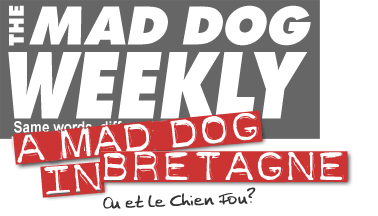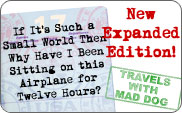| HOME Doggy Style Archive On the Road Holidays Doggy Style Blog Novel |

|

Part VI |
||
You can tell if they really like you because they shorten the greeting even more to just the "Ç", which comes out like a long hissing sound. Or maybe that’s what they do when they know you’re American. |
It’s easy to feel
stupid when you’re in a foreign country. After all, everyone speaks the language
except you. Even the dogs here are smarter than me—they understand their owner’s
commands and I don’t. Speaking French isn’t easy. Especially since the version they use here has absolutely no relation to the one we were taught in school. I know they’re both called the same thing, but face it, Richard Simmons and Arnold Schwarzenegger are both called men too. If you come to France and want to speak with the people here I have one piece of advice: Forget everything they taught you in high school. As if you haven’t already.For starters, no one here uses any of the conversational phrases we learned. They don’t say "Comment allez-vous?" for "How are you?". They say "Ça va bien?", or more casually "Ça va?". One thing you learn right off is that the French are big on variants of speech that change depending on how well you know the person you’re speaking to. You can tell if they really like you because they shorten the greeting even more to just the "Ç", which comes out like a long hissing sound. Or maybe that’s what they do when they know you’re American. One plus about not knowing a language well is you can take a lot of freedom in how personally you take things. It only took a couple of days here before my high school
French started coming back to me. A few phrases here, a couple of words there. I never
would have dreamed I’d have remembered so much! Unfortunately it’s not often you
need to tell someone to ouvrez la fenêtre or fermez votre bouche—it’s
early spring so most windows will stay closed, plus if I tell too many people to shut
their mouths they’ll kick my American butt and I’ll be saying hasta la vista,
baby before you know it. |
|
I get a copy of Ouest France. The first three pages are all devoted to the situation in Kosovo, but after a half hour with the French-English dictionary all I really get out of it is that Yougoslavie is French for Yugoslavia. |
Most people
you meet are very helpful. They listen patiently, smile sweetly, then wrap up the pickled
horse tail I accidentally order instead of a pork chop and thank god for foreigners or
they’d never get rid of these things. Some people nicely correct me, like the woman in the pharmacy who taught me the French pronunciation of ibuprofène when I needed some Advil because of the headache I had when I left the butcher’s. Others act like they can’t understand a word I’m saying, making me repeat myself several times because, well, I have a funny accent. You’d think they’d try to be a little more understanding of my French. After all, if it wasn’t for us they’d be speaking German. Simple things become interesting. Endives were on sale, and since I’m in France and I’ve never eaten them, I buy a couple. How could I go wrong? Besides, there was a free recipe pamphlet to tell me how to cook them. After an hour with my French-English dictionary I figure out that "dans une grande poêle" doesn’t mean I should dance in a big swimming pool, but rather I should put the endives in a big frying pan. From there it was an easy coast downhill and they turned out pretty damned tasty if I do say so myself. News is a problem. The bombing raids on Kosovo started two nights ago. I don’t have a TV and the radio stations are all non-English except for the BBC from Jersey, which absolutely hates to interrupt the farm reports and bird watching programs for something as inconsequential as a NATO-backed bombing attack a few countries away. So I get my news tidbits from a brief daily email news update and friends who are begging me to wear my Canada-Niagara Falls sweatshirt so no one spits on my baguette as I walk down the street. I decide to go to the nearest tabac to get the International Herald Tribune and find out what’s happening, but they don’t have it. At least that’s what I assume after the old man working there spends five minutes searching through the newspaper rack while muttering non-stop to me in rapid fire, but friendly, French. I smile and nod my head the whole time, wondering when it will dawn on him that if I understood his French I wouldn’t be making him search for an English language newspaper. Since he can’t find one, I decide to get a copy of Ouest
France, the regional daily newspaper. The first three pages are all devoted to the
situation in Kosovo, but unfortunately after a half hour with the French-English
dictionary all I really get out of it is that Yougoslavie is French for Yugoslavia. |
|
Try not to get a sore throat while you’re here or you won’t be able to speak French. What we call a rolled ‘R’ is actually a guttural back-of-the-throat sound, much like gargling without the salt water. |
In order to make
your next visit to France a bit easier, and save you some of what I had to learn the hard
way, here are a few language tips I’ve put together to help make your stay here a
little smoother: 1. Always use terms of respect when you say hello. It’s "Bonjour monsieur", "Bonjour madame", and "Bonjour mademoiselle." If you’re not sure whether a woman is a madame or a mademoiselle, mumble. It makes you sound more French anyway. 2. Learn the phrase "non problème", which loosely translates as "no problem". It’s pronounced like English, means the same as in English, and will make you feel very worldly. 3. Be careful about using nicknames. For example, Mad Dog doesn’t translate well. In French it’s Chien Fou, but no one here would use that for a nickname so I don’t either. As a result, everyone here thinks my name is Matt Dogue. 4. The phrasebooks say "Parlez plus lentement, s’il vous plaît" means "Please speak slower." It doesn’t. It actually means "Smile knowingly and say it again as fast as you can." 5. Try not to get a sore throat while you’re here or you won’t be able to speak French. What we call a rolled ‘R’ is actually a guttural back-of-the-throat sound, much like gargling without the salt water. Every word has this sound in it, whether there’s an ‘R’ in it or not. French people who have a sore throat speak Esperanto, so make sure you get an Esperanto-French dictionary before you come here. 6. If you don’t know the French word for something, say the English word the way Inspector Clouseau would, it’s usually amazingly close. Besides, they’ll probably think you’re doing a Jerry Lewis imitation and hoist you on their shoulders and carry you around the Bastille a few times, which is quite an honor since there’s no trace of the Bastille left. When they finally put you down, be polite and say "merci", which means "thank you." Then get the hell out of there before they correct your horrible pronunciation and spit on your baguette.
©1999 Mad Dog Productions, Inc. All
Rights Reserved.
|
|
|
|||
|
|

